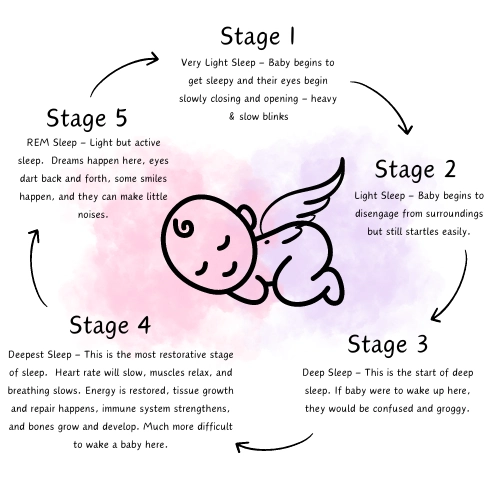
The Science of Sleep
Sleep is often called the body’s best friend, and for babies, it is especially true. Understanding the science of sleep and the role of sleep hormones in infants reveals the importance of good sleep for healthy development. This knowledge will help you as a parent or caregiver create an environment that promotes better sleep for your little angels.
Sleep hormones, such as melatonin and cortisol, play a crucial role in regulating sleep patterns. These hormones begin to be produced in babies around 4 months old, this is why nearly all babies go through the dreaded “4 Month Sleep Regression”! They are beginning to transition from newborn sleep where they simply drifting and out of sleep at inconsistent intervals and aren’t really able to be on a schedule to now being able to rely on hormone production to signal to their body when it is time to sleep and time to wake. This also begins the emergence of sleep cycles. Your baby at around 4 months old will also begin to go through the normal 5 stages of sleep.
The first stage of sleep parents often mistake for “baby is almost asleep”. This is such a common mistake as your baby will be taking long, heavy blinks that get longer and longer. They are actually past the point of drowsy here and already in their first stage of sleep. When laying a baby down for a nap or at bedtime, it is important to time this just right and actually have them down before they hit this first stage of sleep!
Melatonin is known as the “sleep hormone” because it signals the body that it is time to sleep. In babies, melatonin levels start to rise in the evening, helping them feel sleepy as night approaches. For instance, infants who sleep in a dark room may produce more melatonin, leading to longer and more restful sleep. This shows the importance of creating a sleep-friendly environment by dimming lights and keeping the room dark. It is also important that when it is close to bedtime and you as the parent or caregiver are beginning the bedtime routine that the lights in your home are now dim and all sounds are softer and the house in general is as calm as possible (often siblings make this a challenge 😉) so that we can help facilitate the production of melatonin.
Cortisol, on the other hand, is known as the “stress hormone.” It helps wake the body up in the morning. High levels of cortisol can disrupt sleep, making it harder for babies to settle down at night. Parents should avoid stressful situations before bedtime. For example, keeping the evening calm and quiet can help lower cortisol levels and promote better sleep. This highlights the need for a peaceful bedtime routine, which can include reading a book or singing a lullaby. This is also why having the baby in well-lit rooms or especially outside in the sun at times throughout the day will help to signal to your little angel’s brain that it is wake and explore time!
Another important aspect of baby sleep is the sleep cycle. As mentioned earlier, babies go through several sleep cycles each night, which include various levels of light and deep sleep. Deep sleep is essential for growth and development. During this time, the body repairs itself and makes important hormones. For instance, growth hormone is released during deep sleep, supporting healthy physical growth. Parents can encourage longer periods of deep sleep by ensuring that babies have a consistent bedtime and wake-up time, creating a sense of security and routine. It is very common at first when these little angels are just beginning to get used to these hormones and sleep cycles that they will wake up when transitioning through deep and light sleep.
This is why the “regression” happens. Babies have to learn to get themselves back into a deep sleep or transition into the next stage of sleep without signaling to you they need help and doing so all on their own. This is a learned behavior and can take anywhere from several days to several weeks to master. A dependance on sleep props to get to sleep can be detrimental at this stage in your little angel’s development. Find our more about Sleep Props Next!
Understanding the science of sleep and sleep hormones in babies is vital for promoting healthy sleep habits!
